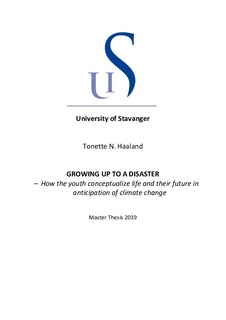| dc.description.abstract | Growing up in anticipation of a disaster like climate change could affect people’s life in a number of ways. Some might feel anxious, sad, worried or even angry at the previous generations for inducing the issue, as well as the current generations for not dealing with the issue well enough. Others might think of climate change as a future issue they do not need to worry about, many might not care at all and feel indifferent. Some might try to downplay their feelings of worry towards climate change, to feel better about not changing their lifestyles to be more climate friendly. This thesis investigates how the youth conceptualize life and their future in anticipation of climate change. Thus, the overarching research question is: What does it feel like to grow up in anticipation of catastrophic climate change?
The thesis theoretical groundwork is built on theory about the adverse impacts of climate change, projections for the future, actions and responses, as well as theory about the public opinion and climate change anxiety. The theoretical aspect is challenged by the empirical findings, which leads to the discussion where the most interesting findings, as well as the most paradoxical findings are dealt with. The teens engaged in this study showed different feelings towards climate change and their futures. Many of them were worried and anxious about climate change consequences, but at the same time, many viewed climate change as first and foremost a ‘future problem.’ Some said they did not care about climate change, and a few of them said climate change was nice, because they wanted warmer weather. These findings guided the discussion towards harmful narratives, how it is like to live in anticipation, a lack of urgency and how many of the narratives were connected to the core issues of the climate change issue.
What seems to be one of the most salient implications found in the thesis is that despite it being clear that many of the participants in the study were concerned in one way or another about climate change, many of them experience a lack of motivation to act climate friendly or change their lifestyles. This conflicting narrative can be traced to a feeling of distance to the impacts of climate change, as many state that they do not think they will feel any impacts in their lifetime, in Norway. However, many also state that they think they will be impacted by climate change, but the issue is too complex and impossible to deal with, so they are reluctant to make great changes to their lifestyles when they are convinced it will not change the outcome. | nb_NO |
